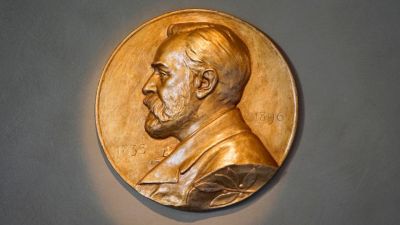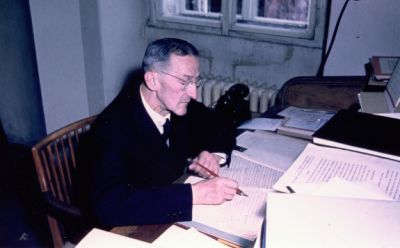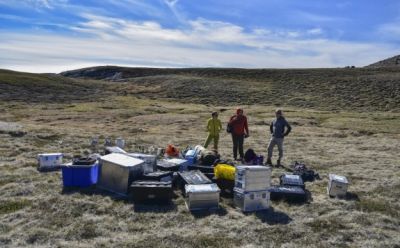Professor Martin Kotora is the head of the Group of Catalysis in Organic Synthesis at the Faculty of Science of Charles University. Earlier this year, Kotora received the prestigious Donatio award – recognising excellence in research, a high number of citations, and publication in top scientific journals.
Chemist Martin Kotora considers the prestigious Donatio Universitatis Carolinae award, given to truly exceptional scientists at Charles University, to be one of the most important. “I appreciate it very much! To be honest, not that many are awarded. The last time I enjoyed similar recognition was nine years ago, when I was honoured by the Czech Chemical Society,” the affable professor recalls. In 2013, the society presented him with the Rudolf Lukeš Prize, which is awarded for an outstanding body of original work in the field of organic, bioorganic and medicinal chemistry. Not directly an award but an exceptional commendation, Kotora was also named Chemistry Europe Fellow a few years back by Chemistry Europe, an association of 16 chemical societies from 15 European countries.
At the Department of Organic Chemistry at the Faculty of Science, Professor Kotora heads the group on catalysis in organic synthesis. It was there, in a “hidden kingdom” of basement level facilities where organic chemists operate, that Forum caught up with the acclaimed researcher. Anyone expecting an erratic scientist running around in a lab coat with a coat sleeve on fire from an experiment (ok, maybe we’ve seen too many movies) would quickly realise their mistake.
Nobel Prize contender?
Last year Kotora commented for Forum on the Nobel Prizes awarded in chemistry. At that time, he said, among other things, that the award for contributions in the field of organocatalysis was not such a surprise; it had been the subject of speculation for some time. In 2022, the Nobel Prize for Chemistry went to the trio of researchers Barry Sharpless, Morten Meldal, and Carolyn Bertozzi (Morten Meldal is from the University of Copenhagen, a partner of Charles University in the prestigious 4EU+ Alliance).
According to Kotora, it is even harder to predict whether the Czech Republic might have a second Nobel Prize winner in chemistry, at least in the near future; Jaroslav Heyrovský won the prize in 1959. “It’s a long road,” the professor says. Asked if he himself might have
a chance, he responds with a smile, “ I don’t have it in me! The principles of natural science haven’t changed much in the last hundred years; it is not impossible, but very difficult, to discover something fundamentally new. There is also a bit of scientific politics involved, and the Nobel Prize has recently been awarded more for lifetime achievement. I hope I still have a lot of work ahead of me.”
Inspiring the next generation
Professor Kotora’s enthusiasm for chemistry is “infectious” and one of his strengths has been inspiring an emerging young generation of chemists. In October 2013, he hosted the CRC International Symposium in Prague at Albertov, where Ei-ichi Negishi, winner of the 2010 Nobel Prize, was a guest of honour. And in the same year, he also created the Quo Vadis Chemistry lecture series, featuring renowned scientists from around the world presenting the latest findings in chemistry. “The series is still running. We just had to take a break for the last two years because of the Covid pandemic. But this spring saw two new lectures and I’m looking forward to continuing,” the professor confirms.
The pandemic also hit research in the labs for several months, cutting off cooperation at least in the initial stages. In fact, various restrictions still remain, although these are currently caused by the worsened economic situation in Europe and around the world. Fortunately the previous pandemic no longer has the reach to threaten a new opportunity of the group led by Kotora to pursue the controlled synthesis of specifically substituted aromatic compounds. “They could have potential use in organic electronics – to make special LEDs, light-emitting diodes with different wavelengths. But that’s a long way off, there’s a lot of work to be done, and it’s not clear whether we’ll be able to achieve our planned goals,” he explains.
Organic chemistry proved stronger
How did Martin Kotora get into his field? In his own words, he opted for chemistry late, when he was 17. Although he originally studied nuclear chemistry, organic chemistry won him over. His interest in organic compounds led Kotora – a postdoc at the time – to study in Japan. He first spent two years as a postdoctoral fellow and then almost four years in Sapporo at Hokkaido University. From Japan, he moved on to the renowned Purdue University in Indiana, USA, for two years, when, still as a postdoc, he was able to join the aforementioned scientist – Nobel Prize winner Ei-ichi Negishi – through his supervisor’s recommendation. “It was an excellent experience, I remember it fondly. I got an overview and was able to compare how things work in the US and Japan. I even learned some Japanese there,” Kotora recalls with a measure of nostalgia.
A chemist with a skipper’s license
In return for part of the financial reward attached to the Donatio award, Professor Kotora intends, among other things, to invite colleagues from abroad to join
in research collaboration. “Without the work of doctors David Nečas and Timothée Cadart, and without the involvement of my students, I would certainly never have received the Donatio,” the chemist explains. His international team has 14 members: together with him, there are four Bachelor’s and two Master’s students, two researchers and five Ph. D. students. When there is a rare opportunity for a break from work, he likes to talk with them over a beer.
Nature is also a major part of his life: he loves hiking and his favourite places include the Bohemian Karst. He also loves the sea and has a skipper’s licence. “I mostly sail off the Croatian coast. Twice I’ve taken the boat to the waters around Scotland and Ireland. It’s so windy there! From a boat you see the world in a completely different way than from land.”
| Professor Martin Kotora |
| Martin Kotora graduated from the Faculty of Science of Charles University with a Master’s degree in nuclear chemistry. From 1986 to 1993, he worked at the Institute of Chemical Processes of the CAS, where he also received his Ph. D. In the 1990s, he pursued science in Japan and the United States. He was a research associate under the Japanese Society for the Promotion of Science Fellowship with Professor Tamotsu Takahashi at the Institute for Molecular Science (Okazaki) and then from 1995 to 1996 with Professor Ei-ichi Negishi at Purdue University. He returned to Charles University in 2000 and is now a professor at the Department of Organic Chemistry. |























